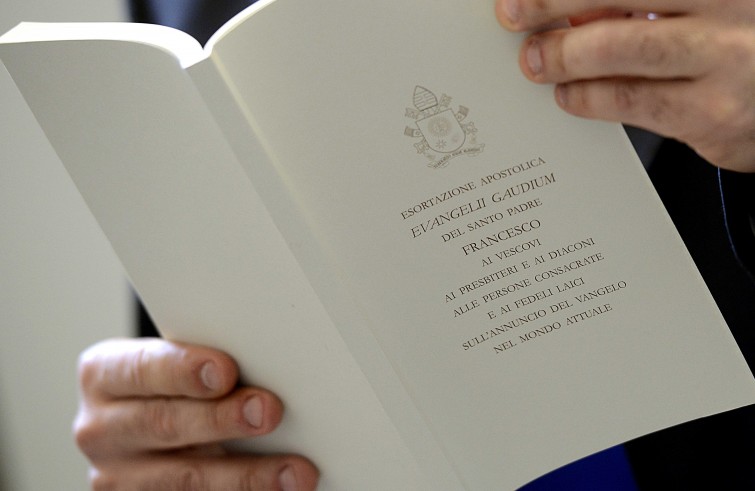
Pope Francis’ establishment of a special World Day of the Poor ought to be seen in the light of the general project of his pontificate condensed in the exhortation Evangelii gaudium. In fact its content can be encapsulated in three points:

First of all, the option for the poor, which must be understood as “a special form of primacy in the exercise of Christian charity, to which the whole tradition of the Church bears witness”. (n. 198). Secondly, the Pope reiterates with Saint Thomas that the poor person, when loved, “is esteemed as of great value” which is what differentiates the true option for the poor from all forms of ideology, from all intentions to use the poor for personal and political gain. Finally, the Pope reminds us that Gospel meaning of the poor and of poverty, are required of everyone (Cf. n. 201).
Within the horizon of this Magisterium, today the Pope calls upon all believers to help make this Day “a tradition that concretely contributes to evangelization in today’s world.” Within this evangelizing horizon I wish to highlight three indications contained in the Message.
The first is a reference to the Magisterium of Vatican II, which reminds us that “Just as Christ carried out the work of redemption in poverty and persecution, so the Church is called to follow the same route that it might communicate the fruits of salvation to men… in the poor and afflicted sees the image of its poor and suffering Founder.” (Lumen gentium n. 8). Echoing those teachings, Francis reminds us that “for Christ’s disciples, poverty is above all a call to follow Jesus in his own poverty.” (n. 4).

A second indication can be found in the encouragement to establish “a true encounter with the poor and a sharing that becomes a way of life.” For Bergoglio the culture of the encounter is a hermeneutic principle as well as a theological principle because “we touch with our own hands the flesh of Christ.” (n. 3). Francis delved into it in the first months of his Petrine Ministry. In the Vigil of Pentecost of May 18 2013 he said: “This is the problem: the flesh of Christ, touching the flesh of Christ, taking upon ourselves this suffering for the poor. Poverty for us Christians is not a sociological, philosophical or cultural category, no. It is theological. I might say this is the first category, because our God, the Son of God, abased himself, he made himself poor to walk along the road with us… A poor Church for the poor begins by reaching out to the flesh of Christ. If we reach out to the flesh of Christ, we begin to understand something, to understand what this poverty, the Lord’s poverty, actually is.”
In line with these last words, the Message contains a third indication found in the relationship between the encounter with Christ in the poor man and the encounter, also with Christ, bestowed in the Eucharist (Cf. n. 3). Referring to the same texts of Saint John Chrysostom quoted by Francis, O. Clément, French Orthodox author died in 2009, denounced, not without reason, the presence of a schism inside the Church separating the Sacrament of the altar from the Sacrament of the brother, explained as follows:
“The Church has preserved the mystery and the Mystical Body of Christ, but some complex distortions – whether it is the decadence of monasticism or the development of an individualistic piety scarcely capable of inspiring creative ethics – often made Christians poorly sensitive to the crucified Christ of history … Today, we feel that it is time to overcome this schism” (Riflessioni sull’uomo, Milan 1990, 89).

Another Pope who felt the strong need to restore the unity between Christ in the Eucharist and Christ in the poor was Blessed Paul VI. When on August 23 1968, in Colombia, he celebrated Mass for the Campesinos he said:
“We have come to Bogotá to honour Jesus in his Eucharistic Mystery, and we are full of joy for having been given the opportunity to do so together with you … [for] you are a sign, you are an image, you are a mystery of the presence of Christ … The entire tradition of the Church recognizes in the poor the sacrament of Christ, which is certainly not identical to the reality of the Eucharist, but it is in perfect analogical and mystical correspondence with it”
Almost fifty years after that Mass, another Pope made an apostolic journey to Colombia. The visit was made also by Saint John Paul II in 1968. Francis’ visit next September shall also be understood as an exhortation to perfect the overcoming of the schism between the Sacrament of the Altar and the Sacrament of our brother, called for in the prophecy of Vatican II..
(*) bishop of Albano, Secretary of the Council of Cardinals (C9)










